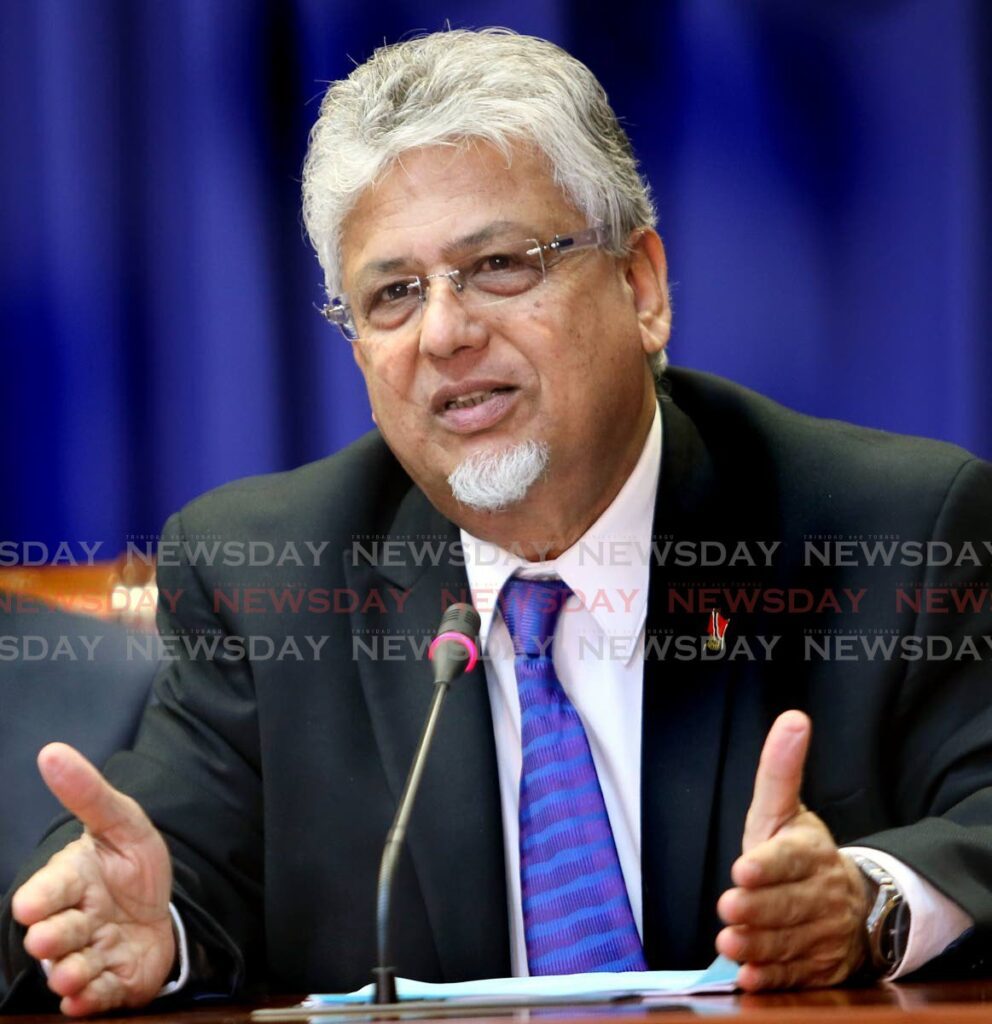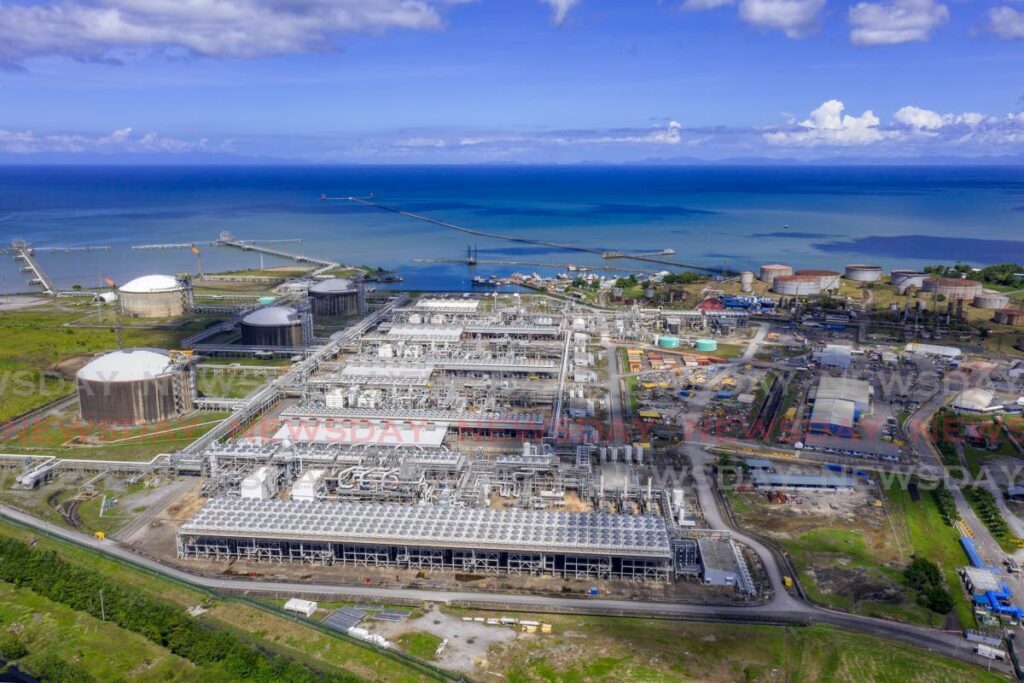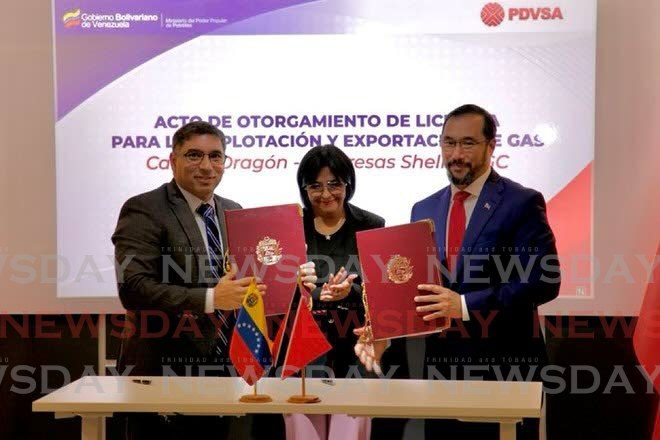Tewarie: Weak policy hampering Trinidad and Tobago’s medium-term growth

BHOENDRADATT Tewarie, former minister of planning and minister of industry, enterprise and tourism believes no substantial policies have been crafted to allow this country to experience economic growth outside the energy industry.
Speaking at a virtual forum to discuss Trinidad and Tobago’s medium-term economic outlook on May 24, Dr Tewarie, who served under the National Alliance for Reconstruction (NAR) and People's Partnership governments, gave a damning assessment of the current government’s efforts to diversify the economy.
“Without fossil fuel gains, the medium term is not viable,” said Tewarie.
“And what does that say for the long term?”
The absence of strong economic policies, he said, will continue to hinder this country’s growth, especially as energy’s role as an “anchor of financial stability” is under threat.
Tewarie shared an example, noting TT’s “fairly robust” information and communication technologies (ICT) infrastructure, saying the local industry, which sees an average of 400 annual tertiary graduates in the field, is heading in the right direction.
However, since the advent of the Ministry of Digital Transformation in 2021, he found the country has taken “no steps to play a successful role in the global value chain.”
He praised the government for advancing energy deals but criticised its perceived lack of transparency and willingness to invest in and promote the non-energy sector.
“How are we doing in energy? In the short term, we are doing bad,” said Tewarie.
“In the medium term, if all the ducks are lined up and there are no irreversible slips between the cup and the lip, one can be hopeful that TT can be in a good place.”
Finance Minister Colm Imbert said in the 2024 budget that about 2.7 billion cubic feet of natural gas is produced daily, from a capacity of about four billion cubic feet.
“(We are) cognisant that we are significantly below the highest production level of 4.2 billion cubic feet per day in natural gas utilised by our petrochemical plants and LNG facility at capacity levels in the past,” Imbert said. “We have therefore taken decisive action in support of our energy production capacity to increase our oil and gas production.”
Imbert added that gas production “will stabilise at approximately 2.6 billion cubic feet in 2024 and 2.5 billion cubic feet in 2025.”

For the long term, the minister added, “The coming onstream of Shell’s Manatee project is expected to assist in significantly reducing the natural gas deficit.
“Furthermore, significant progress on negotiations regarding Woodside’s Calypso deepwater development has been made, and we are eagerly looking forward to bringing this project to fruition.”
Tewarie said he feared the country is banking too heavily on the success of Woodside and other projects.
He said the agreement’s lack of publicly released technical details makes projections difficult.
“I think it should be said the government has done good to stimulate Woodside, to secure long-term arrangements with Venezuela, involving multinationals like Shell domiciled there, and with mutually beneficial arrangements...However, the details of these arrangements are not clear. Some clear – some might say, 'not transparent'.
He added, however, that the government has “done well” to negotiate with the US to secure the Office of Foreign Assets Control (OFAC) licence. This allows TT to collaborate with Venezuela over energy resources in Venezuelan waters despite US sanctions against that country over its political situation.
“(The licence) seems to operate under the radar of existing sanctions or newly-imposed ones on Venezuela, and despite major transgressions over the 2024 Venezuela elections, somehow that seems to be so far protected,” said Tewarie.
“Assuming that whatever happens on the political front, licences will be renewed beyond the current two-year limit, the medium-term prospects look positive for TT in energy. But all of this depends on when we start and how much of an uninterrupted flow of action can be consistently and persistently pursued.”
Last year, the Energy Ministry said natural gas production from the Dragon field offshore Venezuela could start within two years after an 18-km pipeline is installed to connect Dragon to its Hibiscus platform.

“The details are elusive,” Tewarie said, “but a start date in 2024 will give you gas in 2027. If you start in 2025, that will take you to 2028, nearer to 2030.
“The Loran-Manatee (field) is a shared resource. Our share is 26.25 (per cent) but we’re talking about 10.7 trillion cubic feet of reserves.”
Venezuela owns the balance of the share.
He said the continuity of the OFAC licence is critical.
Tewarie again credited the government for making the “realisable by intense negotiation” but insisted that action and “harmonious continuity (will make TT’s) medium-term position better with natural gas.
“A positive medium-term outlook depending on the gas strategy is not guaranteed,” he said, adding that he projects no significant improvement in the oil sector.
“The challenge is how to make it from now until new natural gas flow and that has to do with the petrochemical sector and LNG beginning to realise their potential as well.
He said Atlantic's recent restructuring bodes well for the National Gas Company and TT, "but you have to get the gas first.
“What to do between now and then?”
The public, he said, widely accepts the role of manufacturing and the wider diversity of non-energy exports as solutions to the forex revenue challenge in light of a fall in natural gas production.
He again cited Imbert from the 2024 budget presentation, in which he said the country must continue to build and develop its non-energy sector.
“But how? When?” Tewarie retorted.“After all is said and done, this is 2024. We have missed a lot of opportunities, but the forex revenue crisis is here and escalating.
“How is manufacturing helping in this regard?
Eximbank recently revealed that in 2022 and 2023, US dollars repatriated to TT, based on manufacturers' exports, exceeded forex sold to manufacturers by over US$100 million.
Tewarie said this is a good sign that EximBank policies are working and manufacturers are exporting.
“Moreover, it demonstrates that if you make forex demands with rational policy it can make a difference because policy clarity on its own is an incentive.”
Strong policy and exceptional circumstances, he noted, saw a sharp rise in the local production of chemicals, like dishwashing liquid, detergents and hand sanitisers, after demand skyrocketed during the covid19 pandemic.
“The scarcity of products because of trade logistics problems at that time, the challenges for China as a supplier as well as the shortage of forex itself, may all have contributed to increased local production and the creation of a base for an export platform for some of these products.”
The TT Manufacturers Association said it aims to double exports by next year, using 2019 as a base year. Although this will not fill the immediate forex shortfall, Tewarie said the manufacturing sector, “with the right framework and support, can (significantly contribute) to jobs, exports and forex.”
The 2025 target is something the country must try to achieve, he said, but “much, much more is needed.”
The services sector contributed 48.8 per cent to TT’s GDP in 2022, down from 53.4 per cent a year earlier, although over 70 per cent of the workforce are employed in the sector.
In 2022 TT exported US$896 million but imported US$3.188 billion worth of services.
Tourist arrivals in TT are “embarrassingly low,” he said, adding that they also spend little on arrival.
“This, in my view, is a total policy mistake, because you’re talking about relatively negligible numbers.”
He said as tourism contributes nine per cent to global gross domestic product (GPD), “properly marketed with our assets, tourism can easily contribute ten per cent to the GDP, but we would do well to get it up to five per cent over three years if we took a systematic approach to it and got all our ducks lined up.”
He said there is a “callous and cavalier” attitude towards small and medium-sized enterprises in TT.
“We do not appreciate the value and virtue of family businesses that can grow into large and formidable enterprises,” he said, citing Bermudez Biscuits, Massy, Associated Brands and Bhagwansingh’s Hardware as prime examples.

The country’s 25,000 SMEs contribute roughly 30 per cent of GDP and 30 per cent of the workforce.
He suggested they ought to be prioritised over multinational corporations.
“SMEs and family businesses ought to be actively supported to survive, thrive and grow, because of their economic, social and community value, in addition to their economic contribution.
“To this end, we need business-friendly policy measures and an encouraging environment to help businesses to flourish."
He said businesspeople currently feel targeted and live in fear and that “there can be no positive medium-term future for this country if this continues."

Comments
"Tewarie: Weak policy hampering Trinidad and Tobago’s medium-term growth"